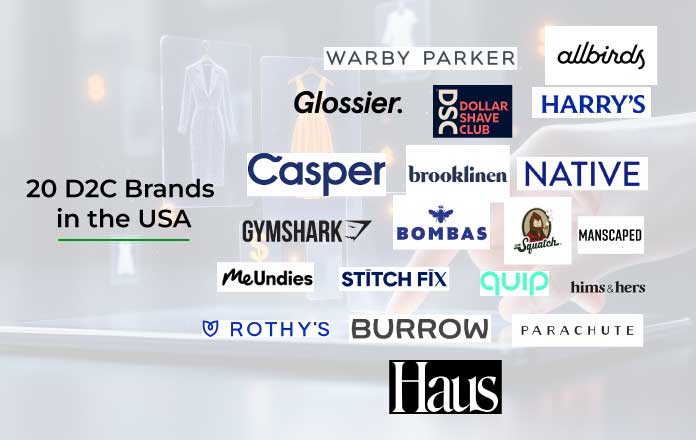Direct-to-Customer (D2C) brands are transforming the retail landscape in the USA. These brands sell directly to customers through digital channels, cutting out the middlemen and offering better pricing, quality, and customer experience. The rise of D2C has not only reshaped consumer expectations but also paved the way for highly successful startup ventures that grow into multi-million dollar businesses.
Let’s explore the top 20 D2C brands in the USA and how they grew into D2C powerhouses.
Top 20 D2C Brands in the USA and Their Growth Stories
1. Warby Parker
Category: Eyewear
Founded: 2010
Warby Parker disrupted the traditional eyewear market by offering affordable, stylish glasses online with a home try-on program. Their ability to collect customer feedback directly helped them refine their products and scale rapidly. Today, they blend online success with a growing number of physical stores.
2. Allbirds
Category: Footwear
Founded: 2016
Allbirds built its D2C empire around sustainability and simplicity. They used eco-friendly materials like wool and eucalyptus, leveraging storytelling around climate-conscious choices. Viral word-of-mouth and influencer marketing helped them grow fast among eco-conscious consumers.
3. Glossier
Category: Beauty and Skincare
Founded: 2014
Glossier started as a beauty blog (Into The Gloss), giving it a built-in community before launching products. They involved their readers in product development, making them feel like co-creators. Social media played a massive role in its D2C boom.
4. Dollar Shave Club
Category: Men’s Grooming
Founded: 2011
Dollar Shave Club disrupted the grooming industry by offering razors on a subscription model. The brand grew rapidly due to its humorous tone, affordability and convenience before being acquired by Unilever for $1B in 2016.
5. Harry’s
Category: Men’s Grooming
Founded: 2013
Harry’s differentiated itself with a sleek design and a premium feel while offering affordability. Their direct relationships with manufacturers and customers gave them control over pricing and quality. Later, they expanded into women’s grooming with Flamingo.
6. Casper
Category: Mattresses
Founded: 2014
Casper revolutionized the mattress market by offering a single mattress-in-a-box model online. They invested heavily in content, influencer reviews and physical pop-up stores. Casper’s digital-first approach became the blueprint for many D2C home brands.
7. Brooklinen
Category: Home Essentials
Founded: 2014
Brooklinen targeted the millennial market by offering premium bed linens without the retail markup. Initially, they achieved rapid word-of-mouth success by being online exclusive and focusing on high-quality customer service.
8. Native
Category: Personal Care
Founded: 2015
Native started as a small natural deodorant brand but quickly gained traction thanks to its clean ingredients and strong online community. Their direct customer feedback loop enabled fast product iteration and scaling. Acquired by Procter & Gamble in 2017.
9. Gymshark
Category: Athletic Apparel
Founded: 2012 (UK), Entered the US Market soon after
Gymshark built its D2C growth around influencer marketing and a strong fitness community on Instagram and YouTube. They skipped traditional retail and focused on limited drops and hype-building to sell out collections in minutes.
10. Bombas
Category: Socks and Apparel
Founded: 2013
Bombas grew through a strong mission-driven model: for every item sold, one is donated. Their comfort-focused products and emotionally resonant mission attracted customers, helping them quickly cross $100M in sales.
11. Dr. Squatch
Category: Men’s Grooming
Founded: 2013
Dr. Squatch used humor-driven YouTube ads and relatable storytelling to grow its male-focused natural soap brand. Their direct D2C approach allowed them to scale quickly through subscriptions and customer referrals.
12. Manscaped
Category: Men’s Personal Care
Founded: 2016
Manscaped created a special place in the market by focusing on men’s grooming below the waist. They used bold branding and entertaining content to talk about a topic that’s usually not openly discussed. Their fun marketing and focus on men’s hygiene made the brand very popular online.
13. MeUndies
Category: Underwear and Loungewear
Founded: 2011
MeUndies used a subscription service, unique designs to build a loyal fan base. They focused on comfort and included everyone in their branding, which helped them shine in the busy clothing market.
14. Stitch Fix
Category: Fashion Tech
Founded: 2011
Combining human stylists with data science, Stitch Fix offered a new way to shop for clothes. Customers receive curated clothing boxes based on their style profile helping the brand build a personalized D2C experience at scale.
15. Quip
Category: Oral Care
Founded: 2015
Quip-made toothbrushes are trendy with a sleek, minimal design and recurring brush head delivery. Their innovative D2C model emphasizes convenience and education, turning dental care into a stylish subscription experience.
16. Hims & Hers
Category: Telehealth and Wellness
Founded: 2017
Hims & Hers tapped into stigmatized health issues like hair loss and sexual health. By offering discreet online consultations and prescriptions, they built trust and scaled D2C wellness with an accessible, tech-driven platform.
17. Rothy’s
Category: Sustainable Fashion
Founded: 2016
Rothy’s grew a passionate fanbase with its stylish, washable shoes made from recycled water bottles. They became a viral hit on social media by focusing on transparency, sustainability, and direct storytelling.
18. Burrow
Category: Furniture
Founded: 2017
Burrow-made high-quality, modular sofas delivered in boxes. They removed traditional showroom costs and provided easy assembly and customization through their website, appealing to urban professionals.
19. Parachute
Category: Home Goods
Founded: 2014
Parachute’s D2C rise came through premium bedding and minimalist design. They tapped into the wellness movement with calming lifestyle branding, subscription offerings, and influencer-led marketing.
20. Haus
Category: Beverages (Aperitifs)
Founded: 2019
Haus offered lower-alcohol spirits crafted from natural ingredients and sold directly to consumers. They used Instagram to market to millennial drinkers and personalized their customer experience with curated product bundles.
Conclusion
Each of these brands shows that with a customer-first mindset, clever digital marketing, and a scalable business model, D2C companies can thrive in any vertical. Whether it’s by simplifying a purchase, improving sustainability, or adding personalization, these 20 D2C brands in the USA are setting the bar for future innovation in retail.



